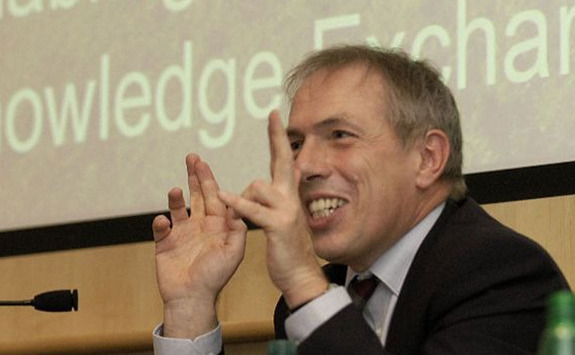Remembering Professor Philip Lowe
It is with great sadness that we announce the death of Professor Philip Lowe, the founder of the Centre for Rural Economy and former Director of the Rural Economy and Land Use Programme.
20 February 2020
In the early 1970s, he rapidly became an authority on the then emerging environmental movement, and he studied the place of science and scientific expertise in this important new social and political force. He published a paper in Nature in 1976 in which, with some foresight, he argued how the rise of environmentalism was highlighting a “crisis of confidence within science and a crisis of science’s authority in society.”
He went on to take up a lectureship at University College London and produced the first major sociological study of the British environmental movement, a book called Environmental Groups in Politics, which helped establish a whole new field of academic work in political science and environmental sociology.
It asked who were these environmentalists, what motivated them, what earlier traditions was this new movement rooted in, and what were the campaigning and political strategies for advancing its causes?
From this work, he moved on to examine the political struggles between the agricultural industry, on the one hand, and, on the other, a set of environmental pressure groups campaigning around changes in the British countryside. Philip’s work was highly influential internationally in understanding corporatist and pluralist styles of politics and policy-making and the roles of groups with insider and outsider status when seeking to influence government.
By the mid-1980s, Philip was now also an international expert on agriculture and countryside politics, produced the book Countryside Conflicts, on farming, forestry and the countryside. With colleagues, Philip established the Rural Studies Research Centre at UCL and embarked upon a series of major studies of rural change, focusing on the politics of house-building and land development and the regulation of farm pollution.
In 1992 Philip was appointed to the new Duke of Northumberland chair in Rural Economy at Newcastle University to set up and lead the University’s Centre for Rural Economy (“CRE”). Under his leadership the Centre’s research culture and reputation grew, and it became an ever more influential voice on the national and international stage on questions of agriculture and rural policy. He established a research centre that was ahead of its time. In those days what is now referred to in rather jargonistic terms as “stakeholder engagement” was a novelty. But at CRE he was able to encourage high quality research involving not only academics, but rural communities, policy makers and businesses.
Philip hardwired into CRE its eagerness to seize the day on important issues facing rural economies. From its early days CRE provided evidence about how rural economies work, their intrinsic strengths and how these might be stimulated and strengthened. Through Philip’s pioneering of ‘neo-endogenous rural development’ theory, the Centre changed the way that government planned development of rural communities, emphasising the need for a practical mixture of bottom-up and top-down approaches, and sharing of ideas through networks. The is now widely accepted in the UK, EU and around the world, for example in the approach of OECD.
After the election of the new Government in 1997, Philip was swept into an array of roles advising ministers and government departments. He was appointed a special advisor to Labour’s Agriculture Minister, Jack Cunningham. The then European Commissioner for Agriculture, Franz Fischler, made the journey to Newcastle to pick Philip’s brains on what to do with the small matter of the Common Agriculture Policy.
Philip was the expert advisor to a host of parliamentary select committees through the 1990s. And the CRE was referred to in the Times as the Government’s ‘favourite rural think-tank’. When David Miliband was promoted to the Cabinet as Secretary of State for the Environment in 2006, he was at the CRE in Newcastle discussing policy dilemmas around farming and land use within no time at all. Philip held numerous public roles. For example as a member of Defra’s Science Advisory Council he led an influential review into the role and capacity of social research within the Department.
As a longstanding Board Member of the Countryside Agency he was vital to bringing national recognition to the breadth and profile of rural economies. As chair of the Vets and Veterinary Services Working Group he would author a major report into the future direction of the Veterinary profession.
In 2003, Philip was appointed to lead a £25million cross-Research Council research programme into Rural Economy and Land Use – the “Relu” Programme. The Programme funded almost 100 research projects over a 10-year period involving almost 500 researchers across the UK.
Philip was an extremely active and ‘hands-on’ Programme Director, working closely with individual project teams to ensure lessons were learned and transmitted. The Programme mixed together human geographers, sociologists, economists, anthropologists, on the one hand, with ecologists, hydrologists, plant scientists, vets and animal scientists, on the other, pioneering radical interdisciplinarity. Philip’s own disciplinary identity was hard to pin down. He might have studied natural sciences at Oxford, but he was essentially operating as a social scientist working in, and in between, sociology, political science and science studies.
Relu was a huge success, and came to be widely recognised as a model – an exemplar - of how research councils can work together and how research teams can actively reflect on their research practice to add value to their interdisciplinary work, and also more effectively engage stakeholders and their vital expertise throughout the research process. Its pioneering insights were relevant to many other fields where the problems humanity faces require a mix of knowledge and expertise from natural and social sciences – problems such as climate change, flooding, plant, animal and human diseases. Relu demonstrated how researchers in the natural and social sciences could work together to address challenges that cut across social and technical domains. It was a watershed in the UK science landscape and continues to be the benchmark for science funders in addressing major socio-technical challenges.
Despite his Parkinson’s diagnosis, Philip continued to be a generous source of inspiration, mentorship and support to staff of the CRE, who would cherish their catch ups with him and always came away energised and all the more richer in ideas. He continued to produce insightful writings on research policy, the nature of expertise, and interdisciplinary working, publishing what would be his final paper in 2019.
Philip Lowe’s achievements were widely recognised beyond his specialist areas and internationally. In 2003 he was awarded an OBE for services to the rural economy. He would often recount that he received the honour at Buckingham Palace alongside David Beckham.
In 2013 he was awarded the prestigious Bertebos Prize by the King of Sweden for his contribution to sustainable rural development and land use, and this was followed in 2014 by an honorary degree of Doctor of Science at the University of East Anglia. Following the 21st anniversary of the establishment of the CRE, Newcastle University received the Queen’s Anniversary Prize in acknowledgement of CRE’s work and influence in the field of rural development, recognition in large part of Philip’s leadership and vision.
A kind man, with an infectious and warm personality, Philip Lowe was always generous with his ideas. He played a huge role in supporting many people’s careers and nurtured the skills and talents of those who had the privilege to meet and work with him. He was and continues to be a source of inspiration to generations of researchers, policy makers, practitioners and students.
Our thoughts are with Philip’s family, wife Veronica, children Sylvia and Olly, son-in-law Pete, and grandchildren Jasmine and Luca.
Professor Philip Lowe, Born 29 March 1950, Died 17 February 2020

